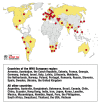Drug-resistant tuberculosis: a worldwide epidemic poses a new challenge
- PMID: 20090877
- PMCID: PMC2807646
- DOI: 10.3238/arztebl.2010.0010
Drug-resistant tuberculosis: a worldwide epidemic poses a new challenge
Abstract
Background: Although the incidence of tuberculosis (TB) in Germany is now declining, the world as a whole faces the threat of a catastrophe that will also affect the industrialized nations. The main reason, aside from TB/HIV co-infection, is the increase of resistant TB strains. The situation is already serious because of the spread of multidrug-resistant TB, i.e., TB that is resistant to the two most important antituberculous drugs, and is being further aggravated by resistance to second-line drugs as well.
Method: Selective review of the literature.
Results: There are an estimated half a million cases of multidrug-resistant TB worldwide, and so-called extensively resistant TB (XDR-TB), with additional resistance to defined second-line drugs, is now prevalent in more than 45 countries. An accurate assessment of the situation is hampered by a widespread lack of laboratory capacity and/or proper surveillance. The problem is mainly due to inappropriate treatment, which may have many causes, but is theoretically avoidable. Aside from programmatic weaknesses, a lack of diagnostic and therapeutic tools causes difficulties in many countries.
Discussion: Only rapid and internationally concerted action, combined with intensified research efforts and the support of the affected nations, will be able to prevent the development of a situation that will no longer be manageable even with 21(st)-century technology.
Figures




Comment in
-
False economies.Dtsch Arztebl Int. 2010 Jun;107(24):435; author reply 436. doi: 10.3238/arztebl.2010.0435b. Epub 2010 Jun 18. Dtsch Arztebl Int. 2010. PMID: 20607086 Free PMC article. No abstract available.
-
Historical background.Dtsch Arztebl Int. 2010 Jun;107(24):435; author reply 436. doi: 10.3238/arztebl.2010.0435a. Epub 2010 Jun 18. Dtsch Arztebl Int. 2010. PMID: 20607087 Free PMC article. No abstract available.
-
What about existing databases?Dtsch Arztebl Int. 2010 Jun;107(24):435-6; author reply 436. doi: 10.3238/arztebl.2010.0435c. Epub 2010 Jun 18. Dtsch Arztebl Int. 2010. PMID: 20607088 Free PMC article. No abstract available.
References
-
- World Health Organization. Anti-tuberculosis drug resistance in the world. Report No. 4. 2008 WHO/HTM/TB/2008.394.
-
- World Health Organization. Guidelines for the programmatic management of drug-resistant tuberculosis. Emergency update. 2008 WHO/HTM/TB/2008.402. - PubMed
-
- Robert Koch-Institut. Bericht zur Epidemiologie der Tuberkulose in Deutschland für 2007. Robert Koch-Institut. 2009 Berlin www.rki.de.
-
- World Health Organization. Global tuberculosis control: epidemiology, strategy, financing. Geneva, Switzerland,: WHO; WHO/HTM/TB/2009.411.
Publication types
MeSH terms
Substances
LinkOut - more resources
Full Text Sources
Medical

